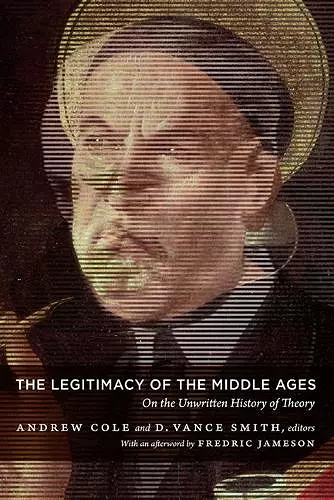The Legitimacy of the Middle Ages
On the Unwritten History of Theory
Andrew Cole editor D Vance Smith editor
Format:Paperback
Publisher:Duke University Press
Published:8th Feb '10
Currently unavailable, and unfortunately no date known when it will be back

Offers an assessment of the place of the Middle Ages in critical theory.
A collection of theoretical essays arguing that theorists of modernity must reckon with the medieval, which is not, as some have asserted, completely separate or different from the modern.This collection of essays argues that any valid theory of the modern should—indeed must—reckon with the medieval. Offering a much-needed correction to theorists such as Hans Blumenberg, who in his Legitimacy of the Modern Age describes the "modern age" as a complete departure from the Middle Ages, these essays forcefully show that thinkers from Adorno to Žižek have repeatedly drawn from medieval sources to theorize modernity. To forget the medieval, or to discount its continued effect on contemporary thought, is to neglect the responsibilities of periodization.
In The Legitimacy of the Middle Ages, modernists and medievalists, as well as scholars specializing in eighteenth-, nineteenth-, and twentieth-century comparative literature, offer a new history of theory and philosophy through essays on secularization and periodization, Marx’s (medieval) theory of commodity fetishism, Heidegger’s scholasticism, and Adorno’s nominalist aesthetics. One essay illustrates the workings of medieval mysticism in the writing of Freud’s most famous patient, Daniel Paul Schreber, author of Memoirs of My Nervous Illness (1903). Another looks at Michael Hardt and Antonio Negri’s Empire, a theoretical synthesis whose conscientious medievalism was the subject of much polemic in the post-9/11 era, a time in which premodernity itself was perceived as a threat to western values. The collection concludes with an afterword by Fredric Jameson, a theorist of postmodernism who has engaged with the medieval throughout his career.
Contributors: Charles D. Blanton, Andrew Cole, Kathleen Davis, Michael Hardt, Bruce Holsinger, Fredric Jameson, Ethan Knapp, Erin Labbie, Jed Rasula, D. Vance Smith, Michael Uebel
“[This] volume opens a productive channel to yet another way of thinking about history – in this case, the history of our discipline, its philosophical underpinnings, and the contributions of medieval thought and medievalism generally to practices of cultural and textual analysis. . . . [T]his volume represents an endeavor of considerable intellectual significance, a strong opening into a set of important questions about the terms and conceptual conditions for the survival of medievalism and medieval studies. . . .” - Paul Strohm, Postmedieval
“Amidst the trash talk of theory in the past tense and the drive of the corporate university to dismantle the conditions of possibility for critique . . . the essays collected in The Legitimacy of the Middle Ages will hearten scholars and also invite them to reflect on their own complicity with current academic events. The volume marks yet another powerful contribution to ongoing investigation into the intersections of the medievalisms of modernity and the modernities of Medieval Studies.” - Kathleen Biddick, The Medieval Review
“Those already engaged in ongoing debates about the complex relation between medieval and modern will find this book to be an essential addition to an important area of inquiry. Those who have never given much thought to the subject will discover a stimulating, and perhaps even transformative, introduction to a crucial set of terms and concepts.” - George Edmondson, Speculum
“[T]he collection should be read as a collaborative work of intellectual history with serious implications for the study of modernity.... It opens up some rich dialogues between medieval and post-medieval studies, and with historians and students of modernity.” - Stephanie Trigg, Partial Answers
“An uncompromising riposte to the notion, in Medieval Studies as elsewhere, that critique is dead and that we should quietly return to tasks of description. A potent demonstration that without critical theory, modernity and the medieval are unintelligible.”—David Wallace, author of Premodern Places: Calais to Surinam, Chaucer to Aphra Behn
“These exciting and challenging essays show that medieval ideas have exerted a huge influence on Freud, Heidegger, Foucault, Derrida, Deleuze, Bourdieu, Žižek, and Negri, thus shaping our understanding of politics, aesthetics, literary criticism, and cultural critique. It is now evident that we all need a medieval basis to found modern Theory.”—Jean-Michel Rabaté, author of The Ethics of the Lie
“[This] volume opens a productive channel to yet another way of thinking about history – in this case, the history of our discipline, its philosophical underpinnings, and the contributions of medieval thought and medievalism generally to practices of cultural and textual analysis. . . . [T]his volume represents an endeavor of considerable intellectual significance, a strong opening into a set of important questions about the terms and conceptual conditions for the survival of medievalism and medieval studies. . . .” -- Paul Strohm * Postmedieval *
“Amidst the trash talk of theory in the past tense and the drive of the corporate university to dismantle the conditions of possibility for critique . . . the essays collected in The Legitimacy of the Middle Ages will hearten scholars and also invite them to reflect on their own complicity with current academic events. The volume marks yet another powerful contribution to ongoing investigation into the intersections of the medievalisms of modernity and the modernities of Medieval Studies.” -- Kathleen Biddick * Medieval Review *
“Those already engaged in ongoing debates about the complex relation between medieval and modern will find this book to be an essential addition to an important area of inquiry. Those who have never given much thought to the subject will discover a stimulating, and perhaps even transformative, introduction to a crucial set of terms and concepts.” -- George Edmondson * Speculum *
ISBN: 9780822346449
Dimensions: unknown
Weight: 431g
288 pages